Watched September 24 - 30, 2007: Ratanaruang, Seong, Zhang and Yau
Ruang rak noi nid mahasan / Last Life in the Universe (Pen-Ek RATANARUANG, 2003)
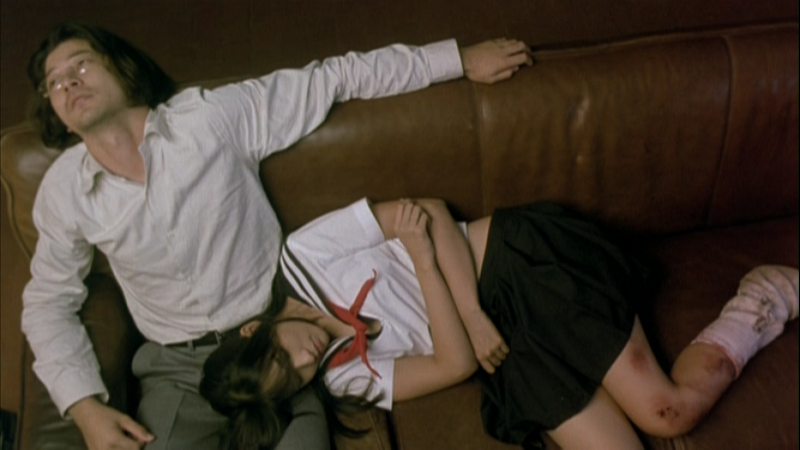 This is only the second film from Thailand I've seen -- and, it just so happens, the second film I've seen that was made by Pen-Ek Ratanaruang. Unlike Monrak Transistor, which seemed to be aimed mostly at a domestic Thai audience, Last Life is clearly an international film, featuring a romance between a Japanese library aide (Kenji, played by Tadanobu Asano), and a young Thai woman (Noi, played by Sinitta Boonyasak),
This is only the second film from Thailand I've seen -- and, it just so happens, the second film I've seen that was made by Pen-Ek Ratanaruang. Unlike Monrak Transistor, which seemed to be aimed mostly at a domestic Thai audience, Last Life is clearly an international film, featuring a romance between a Japanese library aide (Kenji, played by Tadanobu Asano), and a young Thai woman (Noi, played by Sinitta Boonyasak),  who converse in a mixture of Thai, Japanese and English, in an awkwardly realistic seeming manner. Kenji is a neat freak with suicidal tendencies -- and an older brother who is on the lam from Japan, having aggravated his yakuza boss. Noi also has a problematic sibling, a sister who works as a bar girl (and has been messing around with Noi's sleazy ex-boyfriend). The two are brought together by the (unrelated) death of their siblings.
who converse in a mixture of Thai, Japanese and English, in an awkwardly realistic seeming manner. Kenji is a neat freak with suicidal tendencies -- and an older brother who is on the lam from Japan, having aggravated his yakuza boss. Noi also has a problematic sibling, a sister who works as a bar girl (and has been messing around with Noi's sleazy ex-boyfriend). The two are brought together by the (unrelated) death of their siblings.
 Most of the film is spent at Noi's beachside home, which she clearly inherited from prematurely deceased parents -- and seemingly hasn't ever bothered to clean. For good and sufficient reasons, Kenji chooses to avoid his own meticulously kept apartment -- and asks to stay with Noi. Much of his time there is spent cleaning.
Most of the film is spent at Noi's beachside home, which she clearly inherited from prematurely deceased parents -- and seemingly hasn't ever bothered to clean. For good and sufficient reasons, Kenji chooses to avoid his own meticulously kept apartment -- and asks to stay with Noi. Much of his time there is spent cleaning.  Noi, as it turns out, has arranged to go work in Japan soon -- and has been studying Japanese (on language tapes that provide an occasional sonic background). Ultimately it almost pointless to try to describe the plot of this film. The feeling here is somewhat like that of a fever dream -- and one is never quite certain of the boundaries between reality and imagination. The lead performances are absolutely wonderful -- as is the cinematography of Christopher Doyle.
Noi, as it turns out, has arranged to go work in Japan soon -- and has been studying Japanese (on language tapes that provide an occasional sonic background). Ultimately it almost pointless to try to describe the plot of this film. The feeling here is somewhat like that of a fever dream -- and one is never quite certain of the boundaries between reality and imagination. The lead performances are absolutely wonderful -- as is the cinematography of Christopher Doyle.
More pictures:
http://i9.photobucket.com/albums/a59/mkerpan/thai/last01.png
http://i9.photobucket.com/albums/a59/mkerpan/thai/last02.png
http://i9.photobucket.com/albums/a59/mkerpan/thai/last03.png
http://i9.photobucket.com/albums/a59/mkerpan/thai/last04.png
http://i9.photobucket.com/albums/a59/mkerpan/thai/last05.png
http://i9.photobucket.com/albums/a59/mkerpan/thai/last06.png
http://i9.photobucket.com/albums/a59/mkerpan/thai/last07.png
http://i9.photobucket.com/albums/a59/mkerpan/thai/last08.png
http://i9.photobucket.com/albums/a59/mkerpan/thai/last09.png
http://i9.photobucket.com/albums/a59/mkerpan/thai/last10.png
http://i9.photobucket.com/albums/a59/mkerpan/thai/last11.png
http://i9.photobucket.com/albums/a59/mkerpan/thai/last13.png
http://i9.photobucket.com/albums/a59/mkerpan/thai/last14.png
http://i9.photobucket.com/albums/a59/mkerpan/thai/last17.png
http://i9.photobucket.com/albums/a59/mkerpan/thai/last18.png
http://i9.photobucket.com/albums/a59/mkerpan/thai/last19.png
http://i9.photobucket.com/albums/a59/mkerpan/thai/last21.png
http://i9.photobucket.com/albums/a59/mkerpan/thai/last22.png
Oseam (SEONG Baek-yeob, 2003)
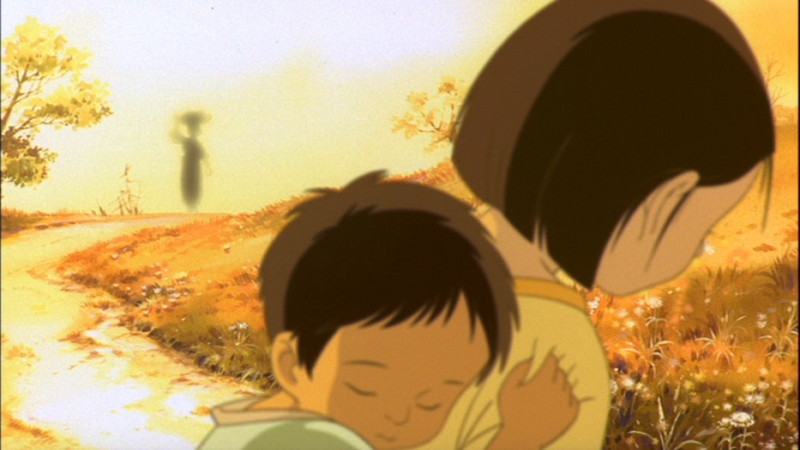 A beautifully animated Buddhist legend about two orphans and a community of monks. A young girl and her younger brother have been homeless since a fire that took the life of their mother and left the girl blind. The girl has never been able to bring herself to tell her little brother that their mother is actually dead,
A beautifully animated Buddhist legend about two orphans and a community of monks. A young girl and her younger brother have been homeless since a fire that took the life of their mother and left the girl blind. The girl has never been able to bring herself to tell her little brother that their mother is actually dead, 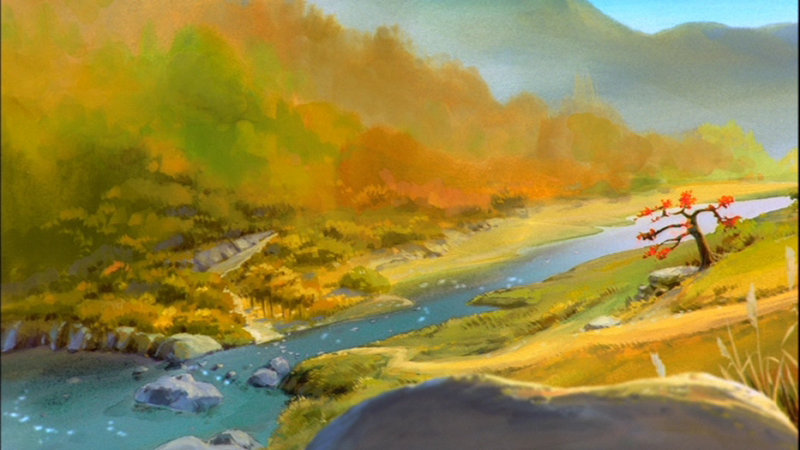 so he continues to hope for a reunion. In their wanderings as beggars, they encounter two monks, who take pity on them and give them a home near their monastery. The boy is a bit of a live-wire, yet he is moved by the monk's rituals.
so he continues to hope for a reunion. In their wanderings as beggars, they encounter two monks, who take pity on them and give them a home near their monastery. The boy is a bit of a live-wire, yet he is moved by the monk's rituals.  The boy and one of the younger monks go to a more remote mountain monastery for a sort of retreat. The boy is left alone when the monk goes on a shopping expedition but can't return due to a sudden heavy snowstorm. In his loneliness, the boy turns to a painted image of the goddess Kwan-eum as protector and companion.
The boy and one of the younger monks go to a more remote mountain monastery for a sort of retreat. The boy is left alone when the monk goes on a shopping expedition but can't return due to a sudden heavy snowstorm. In his loneliness, the boy turns to a painted image of the goddess Kwan-eum as protector and companion.
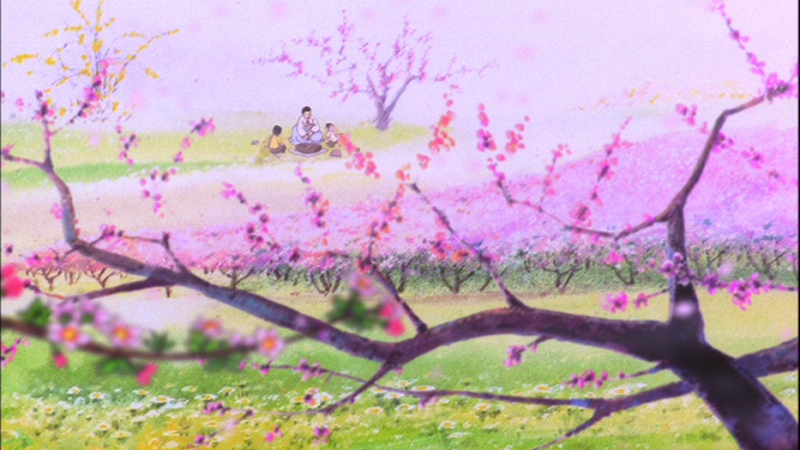 The landscapes and other background drawings for this film are absolutely gorgeous. The character designs and animation are decent, if not quite Disney or Ghibli-level. The story is well-presented. I suppose this could be viewed as a sad film from a Western perspective, but it is obviously intended to ultimately be a joyous one, from a Buddhist viewpoint. The monastery where the events in the film took place is now a pilgrimage site.
The landscapes and other background drawings for this film are absolutely gorgeous. The character designs and animation are decent, if not quite Disney or Ghibli-level. The story is well-presented. I suppose this could be viewed as a sad film from a Western perspective, but it is obviously intended to ultimately be a joyous one, from a Buddhist viewpoint. The monastery where the events in the film took place is now a pilgrimage site.
More screenshots:
http://i9.photobucket.com/albums/a59/mkerpan/sept_07/oseam01.png
http://i9.photobucket.com/albums/a59/mkerpan/sept_07/oseam02.png
http://i9.photobucket.com/albums/a59/mkerpan/sept_07/oseam04.png
http://i9.photobucket.com/albums/a59/mkerpan/sept_07/oseam05.png
http://i9.photobucket.com/albums/a59/mkerpan/sept_07/oseam07.png
http://i9.photobucket.com/albums/a59/mkerpan/sept_07/oseam09.png
http://i9.photobucket.com/albums/a59/mkerpan/sept_07/oseam10.png
http://i9.photobucket.com/albums/a59/mkerpan/sept_07/oseam11.png
http://i9.photobucket.com/albums/a59/mkerpan/sept_07/oseam12.png
Ye. Shanghai / Yoru no Shanhai / Longest Night in Shanghai (ZHANG Yibai, 2007)
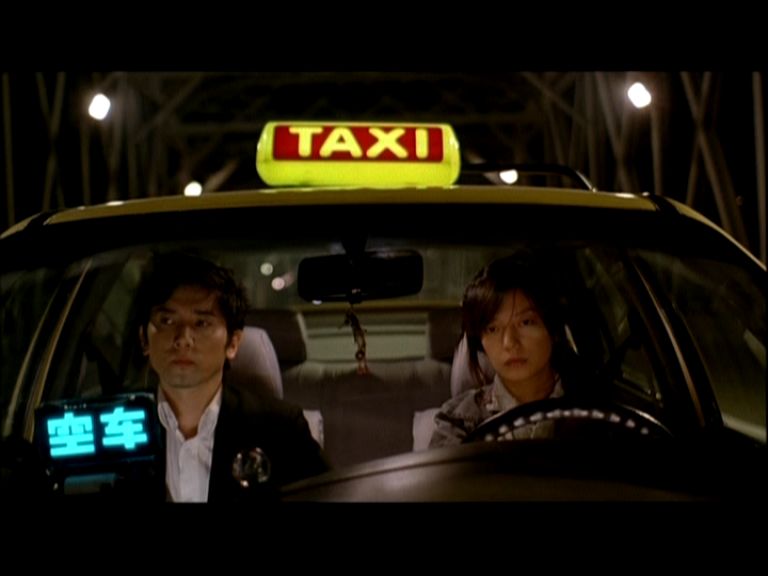 One of the most consistently interesting of younger mainland Chinese directors, Zhang has turned his hand to a tri-lingual romantic comedy. His 30 minute-long Shanghai segment of the anthology film About Love, made a couple of years ago, was a bittersweet (but lovely) romance (of sorts) between a Chinese high school girl and a Japanese college student renting a room above the girl's mother's store. The present film has no lack of pathos, but does have a higher quotient of comedy. The central couple -- who take a while to actually come into contact with each other -- are a famed Japanese hairdresser (Masahiro Motoki) who has come to Shanghai for a big musical extravaganza of some sort (complete with retinue)
One of the most consistently interesting of younger mainland Chinese directors, Zhang has turned his hand to a tri-lingual romantic comedy. His 30 minute-long Shanghai segment of the anthology film About Love, made a couple of years ago, was a bittersweet (but lovely) romance (of sorts) between a Chinese high school girl and a Japanese college student renting a room above the girl's mother's store. The present film has no lack of pathos, but does have a higher quotient of comedy. The central couple -- who take a while to actually come into contact with each other -- are a famed Japanese hairdresser (Masahiro Motoki) who has come to Shanghai for a big musical extravaganza of some sort (complete with retinue) 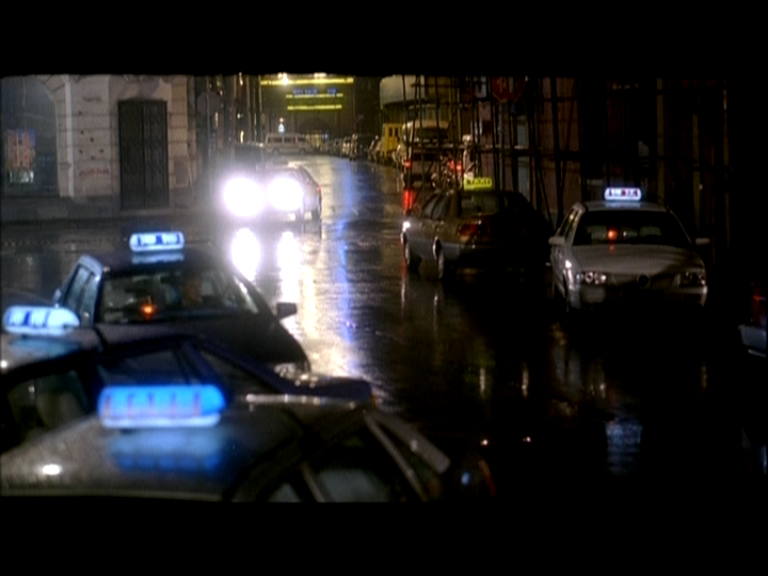 and a young female taxi driver (Vicki ZHAO Wei). After the show is over, Motoki goes for a walk and gets lost -- eventually encountering Zhao (in one of the film's few over-the-top bits of slapstick comedy). Unlike About Love: Shanghai and Last Life in the Universe (see above), neither member of this chance couple can realy speak to the other. Motoki's attempt to rely on English as a fall-back is frustrated by the fact that Zhao's familiarity with English doesn't go much beyond "okay".
and a young female taxi driver (Vicki ZHAO Wei). After the show is over, Motoki goes for a walk and gets lost -- eventually encountering Zhao (in one of the film's few over-the-top bits of slapstick comedy). Unlike About Love: Shanghai and Last Life in the Universe (see above), neither member of this chance couple can realy speak to the other. Motoki's attempt to rely on English as a fall-back is frustrated by the fact that Zhao's familiarity with English doesn't go much beyond "okay".
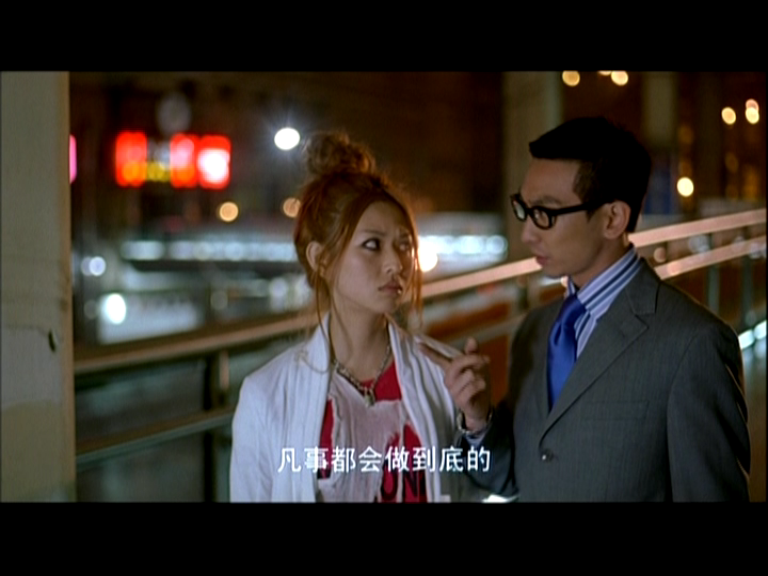 As Zhao struggles with the dilemma of how to get Motoki back to a hotel whose name he doesn't even recollect, and with a personal "catastrophe" (she discovers that the hunky young mechanic who is her colleague -- and who she has a crush on -- is getting married) , the two manage to learn a lot about each other despite their inability to rely on "speech" (they do figure out eventually that they can communicate a bit in writing).
As Zhao struggles with the dilemma of how to get Motoki back to a hotel whose name he doesn't even recollect, and with a personal "catastrophe" (she discovers that the hunky young mechanic who is her colleague -- and who she has a crush on -- is getting married) , the two manage to learn a lot about each other despite their inability to rely on "speech" (they do figure out eventually that they can communicate a bit in writing).  While this main action is taking place, other members of the retinue engage in their own romantic discoveries -- as they try to find their lost employer. It feels rather like an updated Midsummer's Night Dream, transported from the forests of Shakespeare's imaginary Greece to the urban wilds of neon-lit night-time Shanghai. Others in the cast of nightime wanderers include Naomi Nishida, Takashi Tsukamoto, Sam LEE Chan, Naoto Takenaka, Shinobu Otsuka and Dylan Kuo.
While this main action is taking place, other members of the retinue engage in their own romantic discoveries -- as they try to find their lost employer. It feels rather like an updated Midsummer's Night Dream, transported from the forests of Shakespeare's imaginary Greece to the urban wilds of neon-lit night-time Shanghai. Others in the cast of nightime wanderers include Naomi Nishida, Takashi Tsukamoto, Sam LEE Chan, Naoto Takenaka, Shinobu Otsuka and Dylan Kuo.
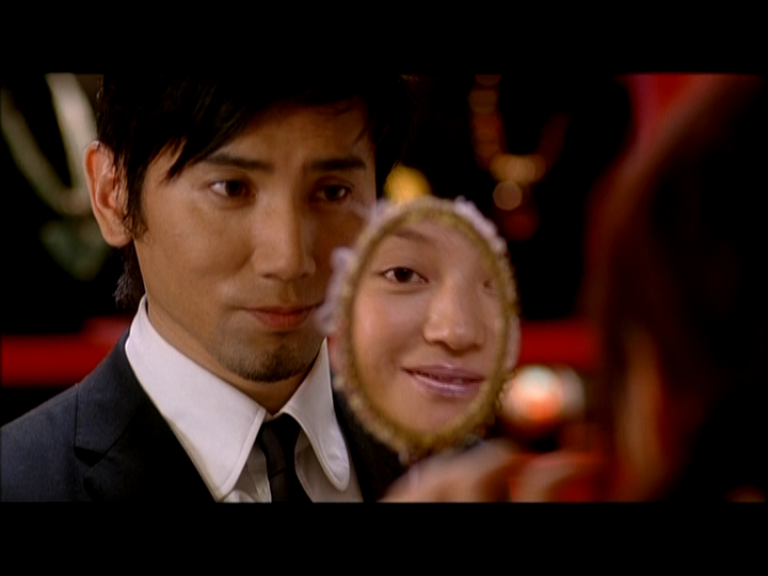 Unfortunately, there is no English-subbed DVD of this film available yet. On the other hand, being linguistically adrift in this particular film might be particularly appropriate -- as it strives to show that there is more to communication than mere language. The DVD (letterboxed, but no anamorphic) was generally passable (and very cheap). It is to be hoped that there will soon be a superior (and subbed) Hong Kong release, so that this delightful romantic comedy audience can find a larger audience.
Unfortunately, there is no English-subbed DVD of this film available yet. On the other hand, being linguistically adrift in this particular film might be particularly appropriate -- as it strives to show that there is more to communication than mere language. The DVD (letterboxed, but no anamorphic) was generally passable (and very cheap). It is to be hoped that there will soon be a superior (and subbed) Hong Kong release, so that this delightful romantic comedy audience can find a larger audience.
Gun chung / Eye in the Sky (YAU Nai-hoi, 2007)
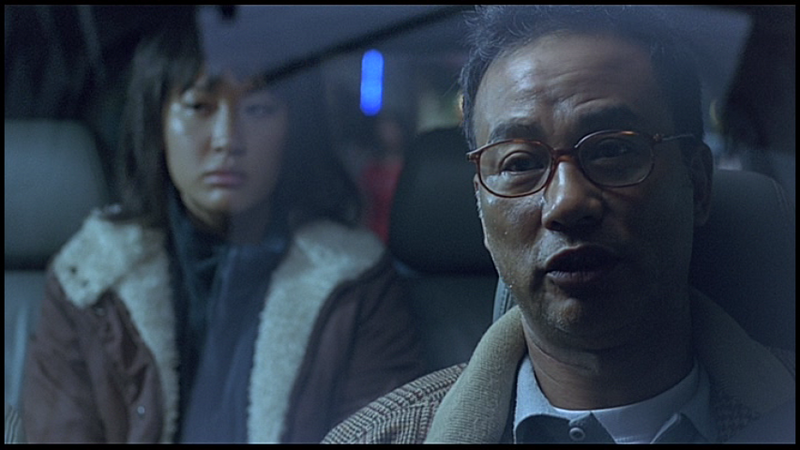 Yau is a long-time Johnnie To colleague, having written scripts for films such as Running Out of Time, The Mission and Running on Karma. This film (featuring a prototypical To movie cast), however, is the first film Yau has directed. At the center of this film one finds Simon Yam. while often he plays the heavy these days, here he is a genial police sergeant in a top-secret unit.
Yau is a long-time Johnnie To colleague, having written scripts for films such as Running Out of Time, The Mission and Running on Karma. This film (featuring a prototypical To movie cast), however, is the first film Yau has directed. At the center of this film one finds Simon Yam. while often he plays the heavy these days, here he is a genial police sergeant in a top-secret unit. 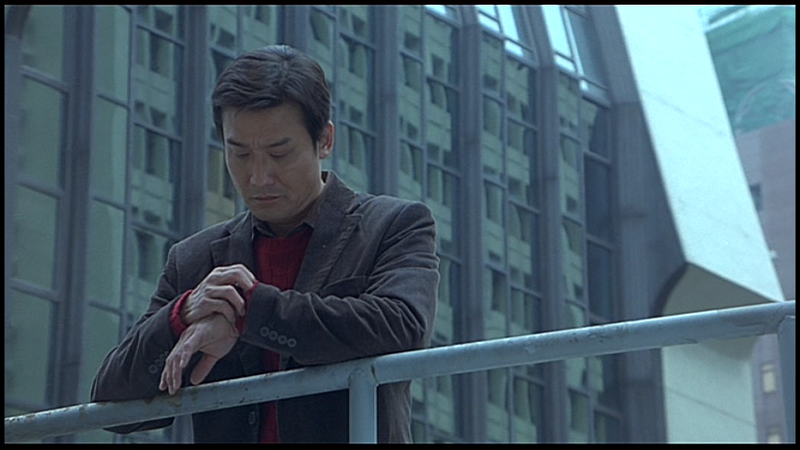 He has to tasks to juggle during the course of the film -- shepherding a new recruit (Kate Tsui) and catching a cagey gang of armed jewelry store robbers led by Tony LEUNG Ka Fai. Both Yam's police operation and Leung's criminal one depend on surveillance -- but the former is dependent on the latest in high-tech equipment while the latter depends largely on Leung's eyes (and brain) watching from rootops above the crime scenes. There seems little point to describing the plot in more detail. So more pictures, instead:
He has to tasks to juggle during the course of the film -- shepherding a new recruit (Kate Tsui) and catching a cagey gang of armed jewelry store robbers led by Tony LEUNG Ka Fai. Both Yam's police operation and Leung's criminal one depend on surveillance -- but the former is dependent on the latest in high-tech equipment while the latter depends largely on Leung's eyes (and brain) watching from rootops above the crime scenes. There seems little point to describing the plot in more detail. So more pictures, instead:
http://i9.photobucket.com/albums/a59/mkerpan/to/eye02.png
http://i9.photobucket.com/albums/a59/mkerpan/to/eye03.png
http://i9.photobucket.com/albums/a59/mkerpan/to/eye05.png
http://i9.photobucket.com/albums/a59/mkerpan/to/eye06.png
http://i9.photobucket.com/albums/a59/mkerpan/to/eye07.png
http://i9.photobucket.com/albums/a59/mkerpan/to/eye08.png
http://i9.photobucket.com/albums/a59/mkerpan/to/eye09.png
http://i9.photobucket.com/albums/a59/mkerpan/to/eye10.png
 This is only the second film from Thailand I've seen -- and, it just so happens, the second film I've seen that was made by Pen-Ek Ratanaruang. Unlike Monrak Transistor, which seemed to be aimed mostly at a domestic Thai audience, Last Life is clearly an international film, featuring a romance between a Japanese library aide (Kenji, played by Tadanobu Asano), and a young Thai woman (Noi, played by Sinitta Boonyasak),
This is only the second film from Thailand I've seen -- and, it just so happens, the second film I've seen that was made by Pen-Ek Ratanaruang. Unlike Monrak Transistor, which seemed to be aimed mostly at a domestic Thai audience, Last Life is clearly an international film, featuring a romance between a Japanese library aide (Kenji, played by Tadanobu Asano), and a young Thai woman (Noi, played by Sinitta Boonyasak),  who converse in a mixture of Thai, Japanese and English, in an awkwardly realistic seeming manner. Kenji is a neat freak with suicidal tendencies -- and an older brother who is on the lam from Japan, having aggravated his yakuza boss. Noi also has a problematic sibling, a sister who works as a bar girl (and has been messing around with Noi's sleazy ex-boyfriend). The two are brought together by the (unrelated) death of their siblings.
who converse in a mixture of Thai, Japanese and English, in an awkwardly realistic seeming manner. Kenji is a neat freak with suicidal tendencies -- and an older brother who is on the lam from Japan, having aggravated his yakuza boss. Noi also has a problematic sibling, a sister who works as a bar girl (and has been messing around with Noi's sleazy ex-boyfriend). The two are brought together by the (unrelated) death of their siblings. Most of the film is spent at Noi's beachside home, which she clearly inherited from prematurely deceased parents -- and seemingly hasn't ever bothered to clean. For good and sufficient reasons, Kenji chooses to avoid his own meticulously kept apartment -- and asks to stay with Noi. Much of his time there is spent cleaning.
Most of the film is spent at Noi's beachside home, which she clearly inherited from prematurely deceased parents -- and seemingly hasn't ever bothered to clean. For good and sufficient reasons, Kenji chooses to avoid his own meticulously kept apartment -- and asks to stay with Noi. Much of his time there is spent cleaning.  Noi, as it turns out, has arranged to go work in Japan soon -- and has been studying Japanese (on language tapes that provide an occasional sonic background). Ultimately it almost pointless to try to describe the plot of this film. The feeling here is somewhat like that of a fever dream -- and one is never quite certain of the boundaries between reality and imagination. The lead performances are absolutely wonderful -- as is the cinematography of Christopher Doyle.
Noi, as it turns out, has arranged to go work in Japan soon -- and has been studying Japanese (on language tapes that provide an occasional sonic background). Ultimately it almost pointless to try to describe the plot of this film. The feeling here is somewhat like that of a fever dream -- and one is never quite certain of the boundaries between reality and imagination. The lead performances are absolutely wonderful -- as is the cinematography of Christopher Doyle.More pictures:
http://i9.photobucket.com/albums/a59/mkerpan/thai/last01.png
http://i9.photobucket.com/albums/a59/mkerpan/thai/last02.png
http://i9.photobucket.com/albums/a59/mkerpan/thai/last03.png
http://i9.photobucket.com/albums/a59/mkerpan/thai/last04.png
http://i9.photobucket.com/albums/a59/mkerpan/thai/last05.png
http://i9.photobucket.com/albums/a59/mkerpan/thai/last06.png
http://i9.photobucket.com/albums/a59/mkerpan/thai/last07.png
http://i9.photobucket.com/albums/a59/mkerpan/thai/last08.png
http://i9.photobucket.com/albums/a59/mkerpan/thai/last09.png
http://i9.photobucket.com/albums/a59/mkerpan/thai/last10.png
http://i9.photobucket.com/albums/a59/mkerpan/thai/last11.png
http://i9.photobucket.com/albums/a59/mkerpan/thai/last13.png
http://i9.photobucket.com/albums/a59/mkerpan/thai/last14.png
http://i9.photobucket.com/albums/a59/mkerpan/thai/last17.png
http://i9.photobucket.com/albums/a59/mkerpan/thai/last18.png
http://i9.photobucket.com/albums/a59/mkerpan/thai/last19.png
http://i9.photobucket.com/albums/a59/mkerpan/thai/last21.png
http://i9.photobucket.com/albums/a59/mkerpan/thai/last22.png
Oseam (SEONG Baek-yeob, 2003)
 A beautifully animated Buddhist legend about two orphans and a community of monks. A young girl and her younger brother have been homeless since a fire that took the life of their mother and left the girl blind. The girl has never been able to bring herself to tell her little brother that their mother is actually dead,
A beautifully animated Buddhist legend about two orphans and a community of monks. A young girl and her younger brother have been homeless since a fire that took the life of their mother and left the girl blind. The girl has never been able to bring herself to tell her little brother that their mother is actually dead,  so he continues to hope for a reunion. In their wanderings as beggars, they encounter two monks, who take pity on them and give them a home near their monastery. The boy is a bit of a live-wire, yet he is moved by the monk's rituals.
so he continues to hope for a reunion. In their wanderings as beggars, they encounter two monks, who take pity on them and give them a home near their monastery. The boy is a bit of a live-wire, yet he is moved by the monk's rituals.  The boy and one of the younger monks go to a more remote mountain monastery for a sort of retreat. The boy is left alone when the monk goes on a shopping expedition but can't return due to a sudden heavy snowstorm. In his loneliness, the boy turns to a painted image of the goddess Kwan-eum as protector and companion.
The boy and one of the younger monks go to a more remote mountain monastery for a sort of retreat. The boy is left alone when the monk goes on a shopping expedition but can't return due to a sudden heavy snowstorm. In his loneliness, the boy turns to a painted image of the goddess Kwan-eum as protector and companion. The landscapes and other background drawings for this film are absolutely gorgeous. The character designs and animation are decent, if not quite Disney or Ghibli-level. The story is well-presented. I suppose this could be viewed as a sad film from a Western perspective, but it is obviously intended to ultimately be a joyous one, from a Buddhist viewpoint. The monastery where the events in the film took place is now a pilgrimage site.
The landscapes and other background drawings for this film are absolutely gorgeous. The character designs and animation are decent, if not quite Disney or Ghibli-level. The story is well-presented. I suppose this could be viewed as a sad film from a Western perspective, but it is obviously intended to ultimately be a joyous one, from a Buddhist viewpoint. The monastery where the events in the film took place is now a pilgrimage site.More screenshots:
http://i9.photobucket.com/albums/a59/mkerpan/sept_07/oseam01.png
http://i9.photobucket.com/albums/a59/mkerpan/sept_07/oseam02.png
http://i9.photobucket.com/albums/a59/mkerpan/sept_07/oseam04.png
http://i9.photobucket.com/albums/a59/mkerpan/sept_07/oseam05.png
http://i9.photobucket.com/albums/a59/mkerpan/sept_07/oseam07.png
http://i9.photobucket.com/albums/a59/mkerpan/sept_07/oseam09.png
http://i9.photobucket.com/albums/a59/mkerpan/sept_07/oseam10.png
http://i9.photobucket.com/albums/a59/mkerpan/sept_07/oseam11.png
http://i9.photobucket.com/albums/a59/mkerpan/sept_07/oseam12.png
Ye. Shanghai / Yoru no Shanhai / Longest Night in Shanghai (ZHANG Yibai, 2007)
 One of the most consistently interesting of younger mainland Chinese directors, Zhang has turned his hand to a tri-lingual romantic comedy. His 30 minute-long Shanghai segment of the anthology film About Love, made a couple of years ago, was a bittersweet (but lovely) romance (of sorts) between a Chinese high school girl and a Japanese college student renting a room above the girl's mother's store. The present film has no lack of pathos, but does have a higher quotient of comedy. The central couple -- who take a while to actually come into contact with each other -- are a famed Japanese hairdresser (Masahiro Motoki) who has come to Shanghai for a big musical extravaganza of some sort (complete with retinue)
One of the most consistently interesting of younger mainland Chinese directors, Zhang has turned his hand to a tri-lingual romantic comedy. His 30 minute-long Shanghai segment of the anthology film About Love, made a couple of years ago, was a bittersweet (but lovely) romance (of sorts) between a Chinese high school girl and a Japanese college student renting a room above the girl's mother's store. The present film has no lack of pathos, but does have a higher quotient of comedy. The central couple -- who take a while to actually come into contact with each other -- are a famed Japanese hairdresser (Masahiro Motoki) who has come to Shanghai for a big musical extravaganza of some sort (complete with retinue)  and a young female taxi driver (Vicki ZHAO Wei). After the show is over, Motoki goes for a walk and gets lost -- eventually encountering Zhao (in one of the film's few over-the-top bits of slapstick comedy). Unlike About Love: Shanghai and Last Life in the Universe (see above), neither member of this chance couple can realy speak to the other. Motoki's attempt to rely on English as a fall-back is frustrated by the fact that Zhao's familiarity with English doesn't go much beyond "okay".
and a young female taxi driver (Vicki ZHAO Wei). After the show is over, Motoki goes for a walk and gets lost -- eventually encountering Zhao (in one of the film's few over-the-top bits of slapstick comedy). Unlike About Love: Shanghai and Last Life in the Universe (see above), neither member of this chance couple can realy speak to the other. Motoki's attempt to rely on English as a fall-back is frustrated by the fact that Zhao's familiarity with English doesn't go much beyond "okay". As Zhao struggles with the dilemma of how to get Motoki back to a hotel whose name he doesn't even recollect, and with a personal "catastrophe" (she discovers that the hunky young mechanic who is her colleague -- and who she has a crush on -- is getting married) , the two manage to learn a lot about each other despite their inability to rely on "speech" (they do figure out eventually that they can communicate a bit in writing).
As Zhao struggles with the dilemma of how to get Motoki back to a hotel whose name he doesn't even recollect, and with a personal "catastrophe" (she discovers that the hunky young mechanic who is her colleague -- and who she has a crush on -- is getting married) , the two manage to learn a lot about each other despite their inability to rely on "speech" (they do figure out eventually that they can communicate a bit in writing).  While this main action is taking place, other members of the retinue engage in their own romantic discoveries -- as they try to find their lost employer. It feels rather like an updated Midsummer's Night Dream, transported from the forests of Shakespeare's imaginary Greece to the urban wilds of neon-lit night-time Shanghai. Others in the cast of nightime wanderers include Naomi Nishida, Takashi Tsukamoto, Sam LEE Chan, Naoto Takenaka, Shinobu Otsuka and Dylan Kuo.
While this main action is taking place, other members of the retinue engage in their own romantic discoveries -- as they try to find their lost employer. It feels rather like an updated Midsummer's Night Dream, transported from the forests of Shakespeare's imaginary Greece to the urban wilds of neon-lit night-time Shanghai. Others in the cast of nightime wanderers include Naomi Nishida, Takashi Tsukamoto, Sam LEE Chan, Naoto Takenaka, Shinobu Otsuka and Dylan Kuo. Unfortunately, there is no English-subbed DVD of this film available yet. On the other hand, being linguistically adrift in this particular film might be particularly appropriate -- as it strives to show that there is more to communication than mere language. The DVD (letterboxed, but no anamorphic) was generally passable (and very cheap). It is to be hoped that there will soon be a superior (and subbed) Hong Kong release, so that this delightful romantic comedy audience can find a larger audience.
Unfortunately, there is no English-subbed DVD of this film available yet. On the other hand, being linguistically adrift in this particular film might be particularly appropriate -- as it strives to show that there is more to communication than mere language. The DVD (letterboxed, but no anamorphic) was generally passable (and very cheap). It is to be hoped that there will soon be a superior (and subbed) Hong Kong release, so that this delightful romantic comedy audience can find a larger audience.Gun chung / Eye in the Sky (YAU Nai-hoi, 2007)
 Yau is a long-time Johnnie To colleague, having written scripts for films such as Running Out of Time, The Mission and Running on Karma. This film (featuring a prototypical To movie cast), however, is the first film Yau has directed. At the center of this film one finds Simon Yam. while often he plays the heavy these days, here he is a genial police sergeant in a top-secret unit.
Yau is a long-time Johnnie To colleague, having written scripts for films such as Running Out of Time, The Mission and Running on Karma. This film (featuring a prototypical To movie cast), however, is the first film Yau has directed. At the center of this film one finds Simon Yam. while often he plays the heavy these days, here he is a genial police sergeant in a top-secret unit.  He has to tasks to juggle during the course of the film -- shepherding a new recruit (Kate Tsui) and catching a cagey gang of armed jewelry store robbers led by Tony LEUNG Ka Fai. Both Yam's police operation and Leung's criminal one depend on surveillance -- but the former is dependent on the latest in high-tech equipment while the latter depends largely on Leung's eyes (and brain) watching from rootops above the crime scenes. There seems little point to describing the plot in more detail. So more pictures, instead:
He has to tasks to juggle during the course of the film -- shepherding a new recruit (Kate Tsui) and catching a cagey gang of armed jewelry store robbers led by Tony LEUNG Ka Fai. Both Yam's police operation and Leung's criminal one depend on surveillance -- but the former is dependent on the latest in high-tech equipment while the latter depends largely on Leung's eyes (and brain) watching from rootops above the crime scenes. There seems little point to describing the plot in more detail. So more pictures, instead:http://i9.photobucket.com/albums/a59/mkerpan/to/eye02.png
http://i9.photobucket.com/albums/a59/mkerpan/to/eye03.png
http://i9.photobucket.com/albums/a59/mkerpan/to/eye05.png
http://i9.photobucket.com/albums/a59/mkerpan/to/eye06.png
http://i9.photobucket.com/albums/a59/mkerpan/to/eye07.png
http://i9.photobucket.com/albums/a59/mkerpan/to/eye08.png
http://i9.photobucket.com/albums/a59/mkerpan/to/eye09.png
http://i9.photobucket.com/albums/a59/mkerpan/to/eye10.png
Comments
Have you gotten a look yet at Stephen Teo's new book about To, Director in Action?
Assessment: Not quite as good as To's best films -- but interesting and enjoyable -- with good performances. Nothing "profound" here -- but definitely worth seeing.